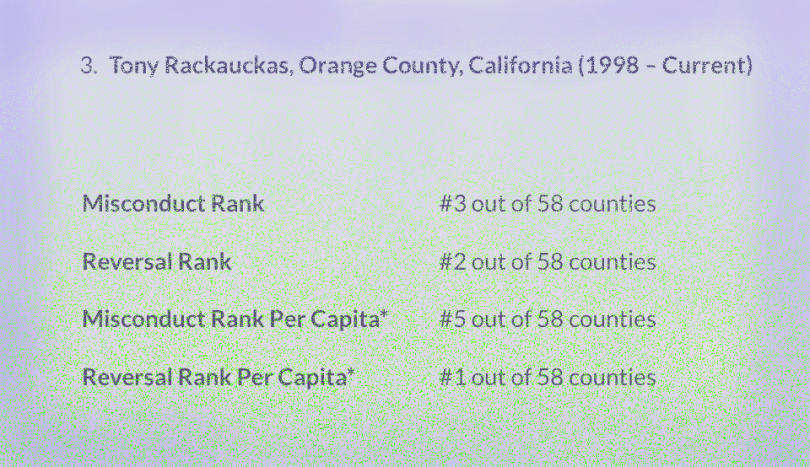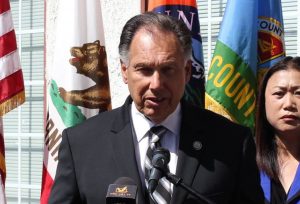New Harvard Law Report Shines a Light On Prosecutorial Misconduct and “Names Names”
In a 2015 essay for the Georgetown law Journal about the nation’s most pressing criminal justice reforms, Judge Alex Kozinski of the Ninth U.S. Circuit Court of Appeals, wrote that a “non-trivial number of prosecutors — and sometimes entire prosecutorial offices — engage in misconduct that seriously undermines the fairness of criminal trials.”
This occurs, Kozinski—a Reagan appointee—wrote, because prosecutors do not have to fear sanctions.
The Supreme Court, said Kozinski in his Georgetown essay, “has told us in no uncertain terms” that a prosecutor’s duty is to seek justice, “not merely to obtain a conviction.”
SCOTUS also laid down, said the judge, “some specific rules about how prosecutors, and the people who work for them, must behave — principal among them that the prosecution turn over to the defense exculpatory evidence in the possession of the prosecution and the police.”
In other words, they must adhere to the landmark 1963 Supreme Court ruling in the case of Brady v. Maryland that requires prosecutors to turn over to the defense any evidence or information that might help the defendant’s case.
This was a rule, however, according to the judge, that was frequently broken—along with other post-Brady rulings that extended the principle, such as Giglio v. United States, which made it mandatory for prosecutors to let the jury know if a witness had been promised favors exchange for testimony.
“There is an epidemic of Brady violations abroad in the land,” Kozinski thundered in a 2013 ruling.
Yet for all this bad conduct, judges “seem strangely reluctant to name names when it comes to misbehaving prosecutors,” Kozinski wrote. “Indeed, judges seem reluctant to even suspect prosecutors of improper behavior, as if they were somehow beyond suspicion….”
Yet there was a way to change the situation, he said. “Naming names and [publicly] taking prosecutors to task for misbehavior can have magical qualities in assuring compliance with constitutional rights.”
Which brings us to the report out of Harvard.
A Harvard Law School Report Take’s Kozinski’s
A new report about prosecutorial misconduct by Harvard Law School’s Fair Punishment Project aims to do precisely what Kozinski suggested. The report’s authors wrote that they were specifically inspired by Kozinski’s directive about the importance of “naming names.”
Accordingly, the Harvard Law report shines a bright and discomforting light on misbehaving prosecutors in four states: California, Louisiana, Missouri, and Tennessee.
To determine which prosecutors had racked up the most incidents of bad behavior, researchers conducted “an exhaustive review” of every available state appellate court opinion dealing with allegations of prosecutorial misconduct published on those four states from January 1, 2010 to December 31, 2015.
Then they looked at what came of those allegations. They wanted to know if the court “made a finding of prosecutorial misconduct.” If so, they next looked at whether misconduct had a deleterious effect on the case and life of the defendant. After that, they looked at whether a court reversed the conviction or provided some other form of relief for the defendant.
Finally, they measured the total number of misconduct findings for each jurisdiction in these four states, the total number of reversals, the total number of misconduct findings per capita, and the total number of reversals per capita.
In California those findings were rather interesting. In terms of sheer numbers, Los Angeles was No. 1 when it came to both misconduct cases and reversals, with 78 misconduct cases during the six-year period examined, and 22 reversals.
Orange County came in 2nd and 3rd in the same ignominious race with 24 misconduct cases and 7 reversals.
When those numbers were recalculated on a per capita basis, Orange County was in 5th place for misconduct cases, and in 1st place for per capita reversals.
Los Angeles ranked 3rd for misconduct cases per capita, and second for reversals per capita.
Nearby Riverside County cruised into a shameful first place for most misconduct cases per capita with 32 cases filed during the six year period. (Riverside was in 5th place per capita for its four reversals.)
In the spirit of Kozinski’s habit of naming names the researchers picked one county prosecutor in each of the four states they found had most repeatedly and egregiously “violated their constitutional and ethical duties.”
In California, the Harvard group’s unequivocal first place winner was Tony Rackauckas, the District Attorney of Orange County.
Why Rackauckas is Number 1
So why was Orange County the winner of the bad behavior award? LA appeared to have equally high ratings in the misconduct race, with Riverside coming up as a strong number three.
For example, there is the 1982 murder case that, in 2016, began giving former Los Angeles City Attorney Carmen Trutanich the vapors when, nearly 30 years after the fact, U.S. District Judge David O. Carter concluded that, in the early 1980s, when Trutanich was a young LA prosecutor, he withheld the identity of a witness and failed to correct false testimony by his key witness, in a death penalty murder trial. Judge Carter threw out Williams’ murder conviction and death sentence, and the state bar launched an investigation into Trutanich’s alleged actions.
Riverside too had a high profile reversal in 2016 for a 1997 murder conviction. The reversal occurred after the 9th Circuit—with Kozinski prominently serving on the three-judge panel that heard the case— concluded that the Riverside prosecutor and the prosecution’s primary witness had both lied on the stand, sending Johnny Steven Baca to prison for first degree murder with a sentence of 70 years to life. After a scathing speech by Kozinski on the topic of prosecutorial misconduct—which also excoriated the judges and other officials who let them get away with it—Attorney General Kamala Harris speedily preempted the ruling by the 9th Circuit, and set aside Baca’s sentence.
(The video above allows you to eavesdrop on the Baca/9th Circuit hearing and it is a classic.)
So, again, why Orange County?
It wasn’t that LA, Riverside, and elsewhere in the state didn’t have some genuinely egregious misconduct cases, said project spokesperson, Stefanie Faucher, via email, when we asked about their choice.
“There were several California counties that stood out in terms of the amount and severity of prosecutorial misconduct and reversals, including Orange, Los Angeles, and Riverside counties,” said Faucher.
But Harvard’s Fair Punishment Project report focused on Orange County, she said, “because even though egregious misconduct in that office has been widely exposed, the current District Attorney has done little to meaningfully address the systemic problems.” (You can find the back story on the OC DA’s “snitch” scandal here and here and here.)
The DAs in Riverside and Los Angeles are also newer to those offices, Faucher said, with Jackie Lacey being elected mid-review period,” and the term for Riverside’s Michael Hestrin‘s began in 2015, which is the final year of the report’s review period.
In contrast, Rackaukas has been the head of the office since the late 1990s. “The prosecutorial misconduct in Orange County happened on his watch.
Indeed, Tony Rackauckas was elected in 1998 as the District Attorney of Orange County, California. Previously, he served for ten years in that office as a prosecutor.
According to the report, if he runs for reelection in 2018, he will have to face questions about 58 allegations of misconduct launched against his office between 1997 and 2009.
“Those allegations have continued in the last several years, during which his office has been embroiled in numerous scandals. The Orange County District Attorney’s office ranked in the top five among all California counties for the total number of misconduct findings (3rd), the total number of reversals (2nd), and for the most misconduct findings per capita (5th), and it ranked first for the most reversals per capita, Faucher said. “The scope of the misconduct has been wide-ranging.”
Indeed, it is a point that is hard to argue.
Prosecutors As Reformers
All in all, the report paints a bleak picture, with Southern California rating high on the bleak scale.
“The prosecutors in these jurisdictions, all of whom are elected officials, are imbued with the public’s trust<‘ the report’s authors wrote in their conclusion. “And each and every one of them has violated it, not just on one or two occasions, but repeatedly.” Prosecutors have “illegally concealed important evidence from the defense, made highly unethical statements and arguments, and committed other types of misconduct that undermines the integrity of criminal convictions in serious cases, and of the justice system itself. Prosecutors are tasked not just with seeking convictions, but also with seeing justice done. Our research shows that these prosecutors are failing in this task in very serious ways.”
And yet, the report reminded us, echoing Judge Kozinski, prosecutors like these and others are rarely if ever held accountable.
“It is clear that the mechanisms for accountability are currently insufficient when a prosecutor breaks the law,” the report’s authors wrote. “A robust discussion about how to improve accountability and to address these injustices is sorely needed.”
Obviously, the Harvard report was written with the intention of helping to jump start that discussion.
One piece of cheering news, according to former prosecutor Miriam Aroni Krinsky, is that a significant part of the discussion—and the call for change—is coming from a growing cadre of reform-minded prosecutors themselves. Krinsky, who spent fifteen years as a federal prosecutor, and was the executive director for LA County’s Citizens Commission on Jail Violence, is now the Founder and Executive Director of Fair and Just Prosecution.
“As this report makes clear,” Krinsky told WitnessLA, “prosecutors have both tremendous authority and tremendous opportunities to promote (or undermine) the interests of justice.” The good news, according to Krinsky, is that in various parts of the nation a new breed of prosecutors have run for office on the notion “that they should be judged by metrics that go beyond a tally of convictions, indictments or guilty pleas.” These new, reformist prosecutors—elected in municipalities that “range from Chicago, to Denver, to Orlando, to Corpus Christi” “…are deeply committed to enhanced transparency, accountability, and smart data-driven approaches..” They will, Krinsky believes, “change the landscape in the field of prosecution.”
May it be so.





More on Tony Rackauckas:
https://en.wikipedia.org/wiki/Tony_Rackauckas
Quite a bad fellow, eh?